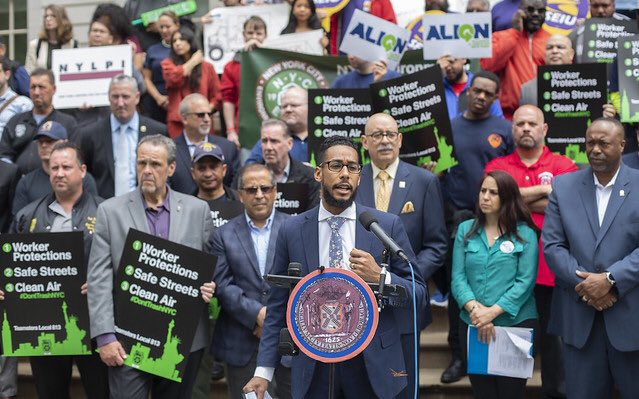The city struck a historic deal on Thursday to improve safety in the rogue private sanitation industry by finally cutting down on cut-throat competition by overworked, barely regulated truck drivers inside neighborhoods that partially contributed to the deaths of at least two dozen people since 2016, including at least four people this year.
Under the deal, a maximum of three haulers will be able to pick up commercial waste in any given neighborhood zone, ending the current free-for-all with as many as 50 private carting companies racing through the streets to collect trash from their business clients. It's the largest element of a massive overhaul following years of advocacy to fix the deadly industry and create safer streets, said Brooklyn Council Member Council Member Antonio Reynoso, who drafted the legislation as the council’s sanitation committee chairman.
“There’s so much we are able to accomplish through this that's going to establish the foundation and future of private sanitation,” said Reynoso.
I am confident that the latest version of the commercial waste zones bill will meet the labor, environmental & public health goals that advocates & I have long sought while addressing NYC's waste management needs. https://t.co/duQKoA3Tkp
— Antonio Reynoso (@CMReynoso34) October 10, 2019
In May, the Brooklyn pol introduced the first draft of the legislation, which called for creating exclusive zones by assigning just one hauler to an area. But the city pushed back, arguing for at least three to five compnanies in order to keep costs down for businesses by allowing for a bidding process, especially in some areas in the outer boroughs that are less dense.
But the latest draft is no concession, Reynoso said, because it will still dramatically cut back the number of vehicles miles traveled by the city’s private carting fleet from the 23 million miles per year it makes now to five million miles per year — a decrease of 78 percent.
“We had some good conversations the mayor’s office ... and why [they] thought a three carter system made sense — adding more carters in those areas brings competition and lowers prices,” Reynoso said. “We’re still achieving our goals. The consolidation is gonna be significant. We’re not going from 23 to 20, we’re going from 23 to five, so anyone that says it’s been watered down just doesn't understand the legislation.”
The bill also incentivizes carting companies to implement safer practices by awarding contracts to those that comply with local and federal regulations and slapping those that don't with fines, like offering employees minimum wage, overtime pay, limitations on hours of service, paid sick and family leave, and safety training programs.
Another safety program meant to make the massive trucks less dangerous for other users on the road was signed into law by Mayor de Blasio in 2015. It gives the industry five more years to install life-saving guard rails on every truck above 10,000 pounds — a safety feature that keeps pedestrians and cyclists from being swept beneath the massive vehicles’ rear wheels.
Reynoso conceded that the 2024 mandate is far away for a basic safety measure — especially when companies have been so slow at installing them despite the city's financial help — and is considering whether additional legislation can help speed up that process.
"I'm working on that. I think the side rails should be something that should be be done much sooner," Reynoso said.
In addition to requiring side rails, the bill also incentivizes shifting to zero-emission trucks for half of the city's private carting fleet by 2030 and the remaining half by 2040.
The legislation comes after years of advocacy from groups like ALIGN, a coalition of labor and neighborhood organizations; the Transform Don’t Trash NYC coalition; and New York Lawyers for the Public Interest, whose director of environmental justice said the forthcoming overhaul of such a dangerous industry will not only make streets safer but will also improve workers' lives and better communities — most of them low-income communities of color — burdened by the excessive number of trucks rolling through each night.
“We are thrilled to be even closer to achieving the commercial waste industry reforms our city urgently needs,” said Rachel Spector. “Our Commercial Waste Zones plan will decrease greenhouse gas emissions, relieve burdens in environmental justice communities, raise labor standards in the industry, and improve street safety."
The Department of Sanitation also said it is looking forward to finally creating a safer industry. The City Council must vote on the bill by Oct. 30, and then implementation will take at least two or three years, according to Reynoso.
This video gives a tiny example of why reform is so vital:






